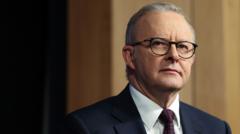Despite high initial hopes, Albanese's government may encounter significant challenges on the path to the May elections, particularly surrounding questions of governance and economic stability.
**Albanese's Election Bid Faces Uncertain Waters Amid Political Turmoil**

**Albanese's Election Bid Faces Uncertain Waters Amid Political Turmoil**
The Australian Prime Minister grapples with key crises as he aims for re-election amidst stiff competition.
In recent weeks, Australian Prime Minister Anthony Albanese's re-election campaign has faced a barrage of unforeseen challenges, compelling him to redirect his focus. Aiming to build momentum following positive developments regarding interest rates, his plans to announce an April election date were derailed by the destructive Cyclone Alfred, forcing the government to respond to the disaster. This incident serves as a metaphor for his term: ambitious plans repeatedly disrupted by external circumstances, including the ongoing cost-of-living crisis, geopolitical tensions, and other global disruptions.
Albanese, who leads the Labor Party, is set to clash with conservative Peter Dutton, head of the Liberal Party, during elections scheduled for May 3. Initially burdened by perceptions of unpopularity, Dutton's standing has surged, aligning with a trend that sees independents and minor parties gaining traction in Australian politics, potentially leading to a hung parliament.
Since his victory in May 2022, Albanese has championed climate reform, addressed economic woes, and advocated for Indigenous rights. However, his efforts to pass a constitutional referendum aimed at enhancing Indigenous representation were met with strong opposition, resulting in a more than 60% "No" vote. This defeat left many Indigenous Australians disillusioned while further damaging Albanese's image as a leader focused on progress.
Dutton's campaign has notably capitalized on the fallout from the referendum, portraying Albanese's government as out of touch amid the escalating crisis of living costs. Many Australians have faced rising interest rates and heightened inflation since Albanese took office, further complicating his narrative about improving the national condition.
While Albanese has traced various issues back to the previous coalition government's policies, his opponents argue that voters are eager for clear solutions. Public trust in traditional party politics is wavering, with voters showing a growing inclination toward independent candidates as the prospect of a hung parliament looms.
The tendency towards independent and minor party support is further augmented by Australia's unique electoral system. With a consistently high voter turnout of around 90% due to mandatory voting regulations, Australian elections tend to reflect a more centrist political landscape. This contrasts sharply with many countries where disenfranchisement has led to more extreme political swings.
Critics have noted that preferential voting may also mitigate polarization, ensuring that established parties like Labor and the Coalition remain relevant despite surging independent candidates. However, as the world witnesses political upheaval, the global context, including evolving U.S.-Australia relations, also weighs heavily on voters' minds.
With just over a month left to connect with the electorate, Albanese will attempt to leverage recent disaster responses to boost his approval ratings. Despite slight improvements, polls suggest Dutton stands a strong chance of overcoming Albanese—leading to a potential historic moment where the incumbent fails to secure a second term.
As the campaign unfolds, Australia remains at a pivotal intersection, considering not just local challenges but the broader implications of a changing global political landscape.
Albanese, who leads the Labor Party, is set to clash with conservative Peter Dutton, head of the Liberal Party, during elections scheduled for May 3. Initially burdened by perceptions of unpopularity, Dutton's standing has surged, aligning with a trend that sees independents and minor parties gaining traction in Australian politics, potentially leading to a hung parliament.
Since his victory in May 2022, Albanese has championed climate reform, addressed economic woes, and advocated for Indigenous rights. However, his efforts to pass a constitutional referendum aimed at enhancing Indigenous representation were met with strong opposition, resulting in a more than 60% "No" vote. This defeat left many Indigenous Australians disillusioned while further damaging Albanese's image as a leader focused on progress.
Dutton's campaign has notably capitalized on the fallout from the referendum, portraying Albanese's government as out of touch amid the escalating crisis of living costs. Many Australians have faced rising interest rates and heightened inflation since Albanese took office, further complicating his narrative about improving the national condition.
While Albanese has traced various issues back to the previous coalition government's policies, his opponents argue that voters are eager for clear solutions. Public trust in traditional party politics is wavering, with voters showing a growing inclination toward independent candidates as the prospect of a hung parliament looms.
The tendency towards independent and minor party support is further augmented by Australia's unique electoral system. With a consistently high voter turnout of around 90% due to mandatory voting regulations, Australian elections tend to reflect a more centrist political landscape. This contrasts sharply with many countries where disenfranchisement has led to more extreme political swings.
Critics have noted that preferential voting may also mitigate polarization, ensuring that established parties like Labor and the Coalition remain relevant despite surging independent candidates. However, as the world witnesses political upheaval, the global context, including evolving U.S.-Australia relations, also weighs heavily on voters' minds.
With just over a month left to connect with the electorate, Albanese will attempt to leverage recent disaster responses to boost his approval ratings. Despite slight improvements, polls suggest Dutton stands a strong chance of overcoming Albanese—leading to a potential historic moment where the incumbent fails to secure a second term.
As the campaign unfolds, Australia remains at a pivotal intersection, considering not just local challenges but the broader implications of a changing global political landscape.





















